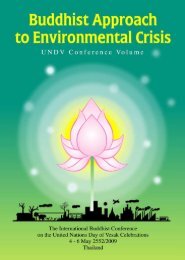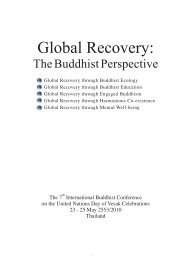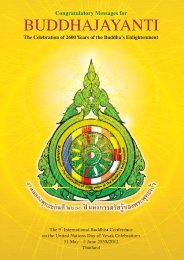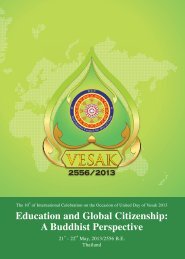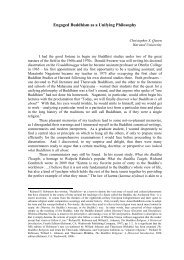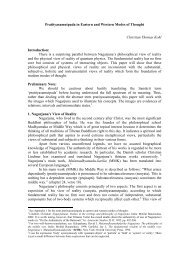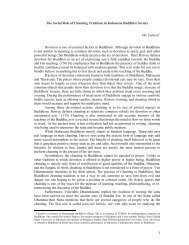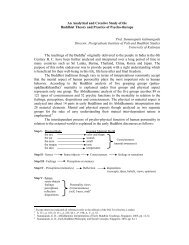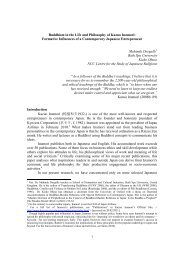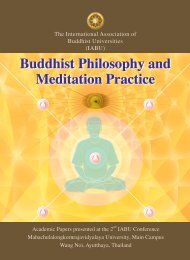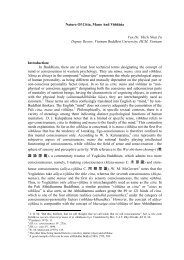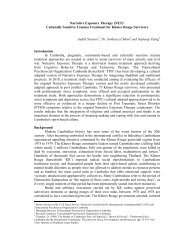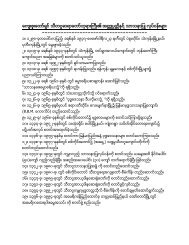American Habits and Fresh Baked Bread Cynthia Drake Naropa ...
American Habits and Fresh Baked Bread Cynthia Drake Naropa ...
American Habits and Fresh Baked Bread Cynthia Drake Naropa ...
Create successful ePaper yourself
Turn your PDF publications into a flip-book with our unique Google optimized e-Paper software.
of these statements. What would <strong>American</strong> Buddhism look like in the future? This<br />
tradition, or more accurately, this set of traditions, is still very much in the process of<br />
fully emerging on the <strong>American</strong> l<strong>and</strong>scape. But it has announced itself clearly <strong>and</strong> firmly<br />
enough that there is no doubt that there will be an <strong>American</strong> Buddhism in the 22 nd<br />
century. And what will it look like? Donald K. Swearer of Swarthmore College offered<br />
one response: “The diversity of Buddhist expressions in America in particular, <strong>and</strong> the<br />
West more generally, is a unique chapter in the history of Buddhism. Buddhist<br />
sectarianism <strong>and</strong> its development in different cultural traditions are nothing new, so in a<br />
sense, we’re witnessing a new version of an old story. How this diversity will sort itself<br />
out in the coming decades remains to be seen” (“The Direction of Buddhism in America<br />
Today”).<br />
Diversity <strong>and</strong> synthesis. Heritage <strong>and</strong> convert communities. The dharma as<br />
doctrine <strong>and</strong> the dharma as embodied wisdom. These are some of the contrasting<br />
elements up for grabs in the great <strong>American</strong> Buddhist experiment. And what of the<br />
<strong>American</strong> component in this equation? How will the dharma take root in the last<br />
remaining superpower? Will the dharma be co-opted as it is interpellated into <strong>American</strong><br />
hegemony? Is it possible that <strong>American</strong> culture will be interpellated into the views of<br />
interdependence, emptiness, <strong>and</strong> Buddha Nature?<br />
This paper will explore the current l<strong>and</strong>scape of <strong>American</strong> Buddhadharma as it<br />
seeks out clues about its future. In particular, I ask how the emerging traditions of<br />
<strong>American</strong> Buddhisms might act as powerful antidotes to the entrenched <strong>American</strong> habits<br />
of consumerism <strong>and</strong> individualism. If traditional Buddhism is ready for a challenge, the<br />
United States is ready to offer it. Ours is arguably the most distracted, materialist, <strong>and</strong><br />
pervasively aggressive culture in the history of the world. We are numb to horrors <strong>and</strong><br />
sensitive to our own complaints. To aid in my exploration, I look at the work of Robert<br />
Bellah <strong>and</strong> fellow researchers on late-20 th century individualism <strong>and</strong> religion as well as<br />
theories on the evolution of religion to explore this l<strong>and</strong>scape of <strong>American</strong> dharma. Using<br />
this theoretical work as a lens through which to examine <strong>American</strong> religious praxis, I<br />
argue that the Buddhadharma practiced in the United States is both true to its Asian roots<br />
<strong>and</strong> at the same time offers a distinctly Western register. An oft-cited analogy for dharma<br />
shared by numerous <strong>American</strong> sanghas is that dharma should be like fresh-baked bread<br />
rather than a story about bread. The dharma or dharmas that emerge from my research are<br />
direct, breathing, alive; ultimately, I argue, the only versions of Buddhism that could<br />
possibly make an impact in 21 st century America must bear the aroma of fresh-baked<br />
bread.<br />
The <strong>Habits</strong> of <strong>American</strong> Individualism<br />
The relationship between <strong>American</strong> individualism <strong>and</strong> religious praxis was the<br />
subject of one of the most widely-discussed works of late-20 th century scholarship on<br />
religion. In <strong>Habits</strong> of the Heart, Robert Bellah <strong>and</strong> colleagues examine the roots of<br />
<strong>American</strong> individualism <strong>and</strong> look to the early generations of <strong>American</strong> society to try to<br />
find its source. Drawing upon the work of Alexis de Tocqueville, they chart the potential<br />
for individualism embedded in the earliest generations:<br />
Tocqueville described the mores—which he on occasion called the “habits of the<br />
heart”—of the <strong>American</strong> people <strong>and</strong> showed how they helped to form <strong>American</strong>



